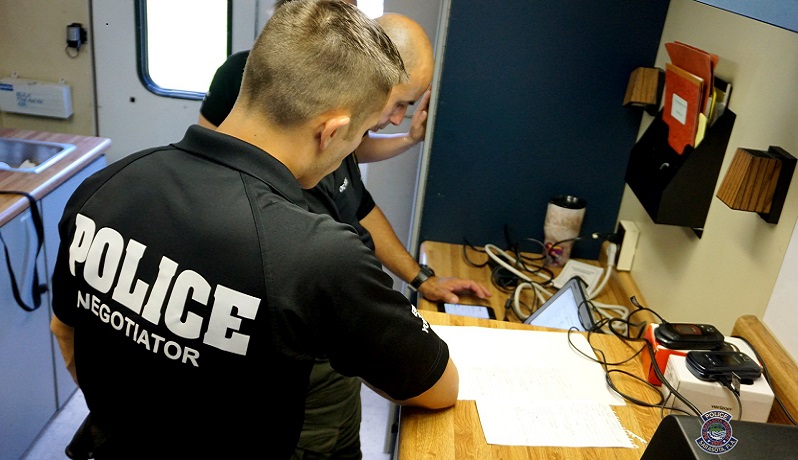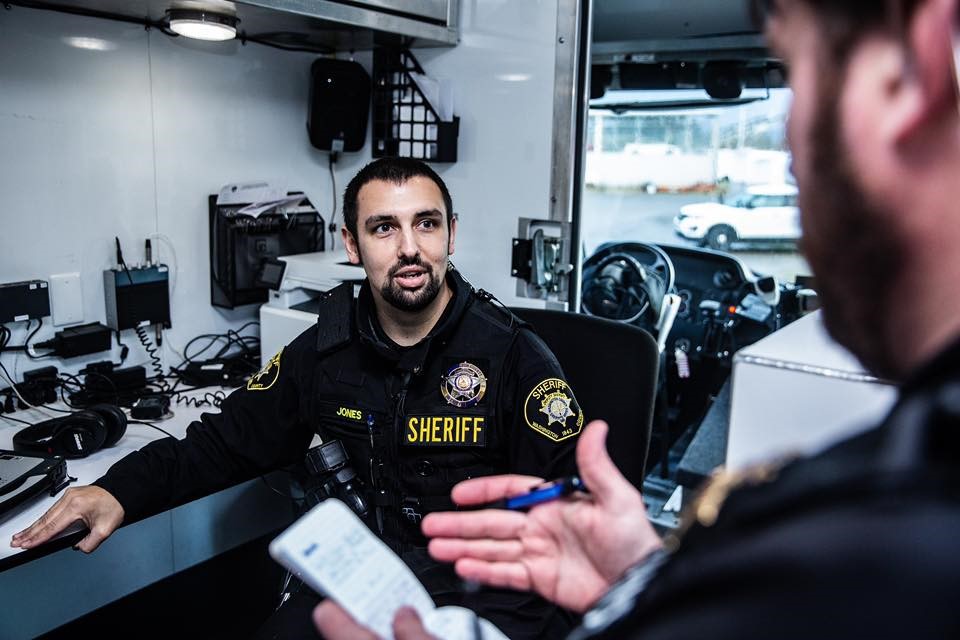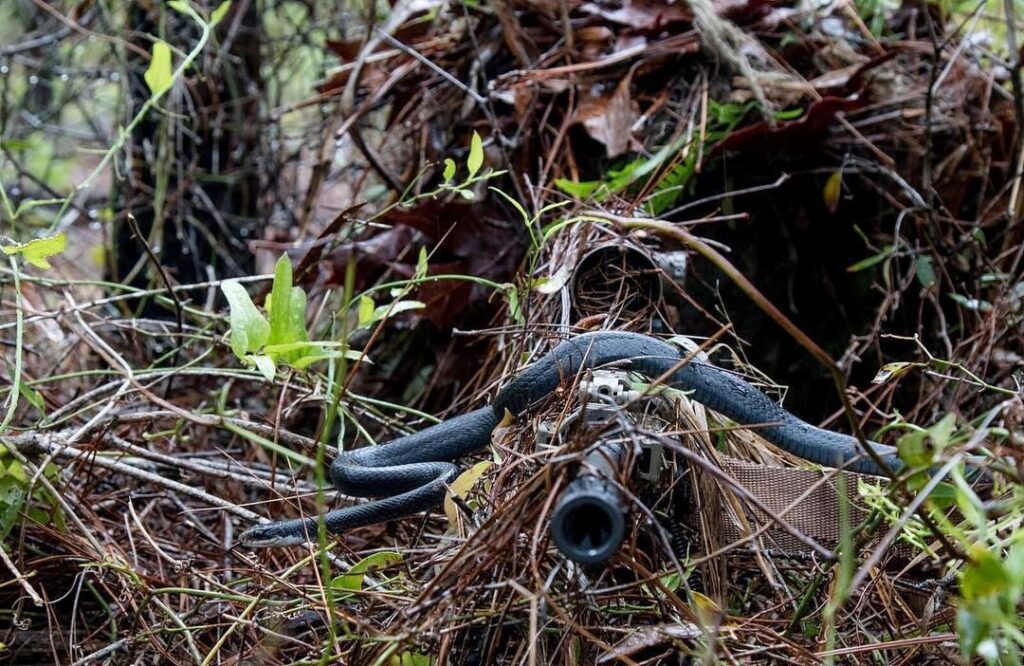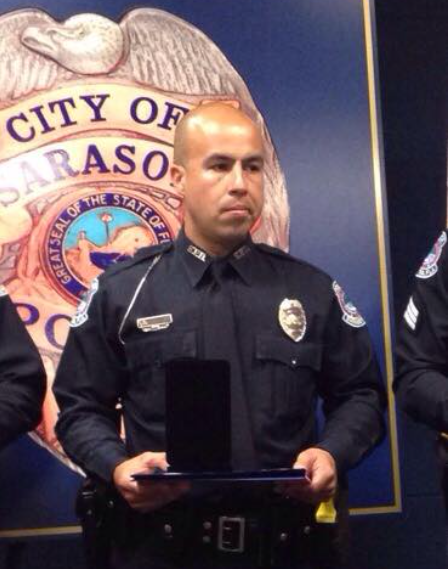
Although it is not every day that law-enforcement professionals deploy Crisis Negotiations Unit assets to instances involving standoffs, the ultra-preparation and training for these chess-like scenarios are paramount.
Today, we take a glimpse of the training aspects of police personnel honing skills to more effectively handle often tension-filled engagements involving high-strung individuals threatening violence due to unmitigated psyches. It all starts with acute listening and critical thinking skills to help loosen the tight knots harbored by distraught folks feeling as if their backs are up against the ropes.
The Sarasota Police Department recently released some brief footage and a pseudo tour of its Crisis Negotiations Unit (CNU) mobile command center they deploy, occupied by staff equipped with interpersonal skills to peacefully quell these hair-raising situations.
As described in that video, Hostage Negotiations and Crisis Negotiations are generally the same things, with respective law enforcement organizations opting for one or the other branding (or another variation on the theme). Important to note that not every person in crisis reigns over one or more hostages; we’ll touch upon that in a bit.
The one line that supremely stood out among all the pertinent information provided by Sarasota Police Sergeant Luis Paris, team leader for the Florida police department’s CNU, is that “a lot of times people look at it as… you don’t need to train on things that you don’t do as often. But we look at it the other way…because when those things happen that don’t happen as often, then you are less prepared for them.
“So, we look at it as if it’s something that sounds like a remote possibility that can happen, we need to pick that up and we need to train on it because that means we’ll be ready when it does happen.”
Police Preparedness
That professional constitution undoubtedly applies to all of policing, inherently confronting myriad unknowns in a nanosecond, launching an immediate response of trained personnel as the 9-1-1 public safety dispatchers receive the calls heavy with haywire and mayday.
Similar to other law enforcement entities safeguarding their respective tracts of jurisdictional responsibility in America, the Sarasota Police Department CNU trains diligently…
Every month, the Sarasota PD personnel with the CNU role-play scenarios and analyze potential hiccups that must be mitigated by the finesse of first responders: foresight. All of these carefully culled cops previously attended a police academy’s or law enforcement agency’s specialty training courses, immersing in the calm, cool, collected material necessary in talking people down from gross hysteria, desperate misdeeds, and malice-laden minds.
Naturally, officer safety is always at the fore of such instances whereby threats of violence to self (in-crisis individual), any hostages, and cops are typically waged repeatedly. The grit of anyone determined to wreak havoc requires special considerations and a calculus of words across hourglass-like moments engendering the burn of time…aka “as long as it takes.”
That is why any police negotiators navigating a call-out stage in a Mobile Command Center replete with all the requisite electronic devices to intertwine resources and maintain measured dialogue as the standoff ensues.

(Photo courtesy of the Washington County Sheriff’s Office.)
A Sarasota Police spokesperson provided the following snippet encompassing the mission of the Crisis Negotiations Unit:
Every month, the CNU works through “multiple scenarios that may be called in with a moment’s notice.
“Their training came into use […] when they worked for 3 hours to safely talk a man, who was contemplating suicide, out of a situation and get him the help he needed.
“CNU members train for possible barricaded, suicidal, and hostage situations. Their job is to ultimately establish communication with people who are under extreme stress or trauma in a critical situation. They work to de-escalate a situation, bring hope to those involved, and make sure everyone goes home safely.”
To have meaningful, constructive dialogue with someone in distress implies knowing as much about them as possible: comprehending the person’s life journey leading up to tension-filled moments. What have they been enduring? Divorce? Loss of career? Estrangement from family? Guilt or shame stemming from something they’ve done for which they are feeling responsible? A bevy of burdens may be on the individual’s mind.
Police CNU specialists sift and sleuth to better understand and aid those experiencing duress.
LEOs routinely conduct a swift bio of the person in dire straits: checking police records, analyzing publicly available information, garnering personal nuances from kin (even employing their presence, if deemed useful and not a hindrance), obtaining historical perspectives from neighbors (who are typically evacuated if in some proximity of the zone of operations), to name a few sources from which to gather a pedigree applied toward strategies of de-escalation and zero harm to anyone.
The other end of the CNU spectrum entails prepping for the worst-case scenario…
Conflict Resolution
Just before my police career concluded (medical nemesis), I was deployed along with our Crisis Negotiations Unit to a “barricaded subject” incident, at around 4 a.m.
The subject’s residence was one among a few on a cul-de-sac, so all police resources and staged fire/rescue paramedics converged in minimal space. Not a decent safety setup, so our first responders eased back, far enough for officer safety and close enough to develop/continue communications.
Our CNU personnel occupied its Mobile Command Center outside lines of fire, communicating from a distance.
The CNU team leader was endeavoring through the hierarchy of strategies to end this situation peacefully. Time ticked away and was nearing daybreak.
Our Crisis Negotiations Unit team leader was a Patrol Division sergeant who had a grad degree in clinical psychology under his belt, and his calm, cool, collected demeanor was suited for conflict resolution feats.
And that was key. What worked well was good ole measured communications with the aged man who had been imbibing, who was admittedly in possession of ample firepower (corroborated by his family who lived elsewhere), and the patience of saints who pinned justice badges and harbored the beacon of peaceful means and even-keel temperance.
During this particular standoff, there was a change in tempo noted in the in-crisis individual, whose octave soared, accompanied by flailing limbs in a mostly dark recess of his property. In that dark patch was one of our patrol officers, a former U.S. Marine, militarily trained as a sniper. That’s the nitty-gritty end of the police crisis negotiator’s strategy spectrum.
Completely covered by a Ghillie suit and armed with sniper firepower, our certified sniper lay dormant in the thicket of grass/shrubbery. His night-vision scope had the in-crisis man in his reticle, listening for the team leader’s greenlight command, should the subject do anything to warrant a deadly force response.

(Photo courtesy of TROOPER.)
As mentioned above, the guy’s flailing was prevalent. To paint the original image, the man resembled Santa Claus, replete with a long flowing white beard and puffy white hair, potbellied and shirtless, wearing nothing but threadbare shorts.
Clandestinely, our police sniper melded with nature in the darkness, his statuesque stillness enabling his laying-in-wait stealth. Fortunately, his firepower was not needed after all.
As is often depicted in Hollywood flicks, our CNU team leader incorporated the distressed man’s daughter, having her transported to the scene. The sight of her and her sounds of pleading words to him, managed to alter the man, in positive ways. Indeed, conflict resolution requires a patient professional de-escalating duress down to peaceful epilogues, from which training modalities are back-tested and tweaked for more-perfected applications. Does it always go according to the police playbook? No. But, as Sergeant Paris stated above, cops must be diligent with training for any potential calamity, readied whether it unfolds or not.
Concluding with a winning example of CNU feats, we go back to 2014, when then-officer Luis Paris “demonstrated incredible poise under pressure and exceptional performance” during a suicidal subject incident.
“Upon arrival, the subject was in a tree with a rope tied around his neck. As a member of the Crisis Negotiations Team, Officer Luis Paris immediately responded on scene.” That underscores the value of police take-home cars —equipped with tools of the trade for the specialty at hand— to respond to scenes without delay of going to Police HQ and checking out keys to a cruiser (needlessly burning precious time). Back to our life-saving mission in Sarasota…
Officer Paris “engaged in conversation with the subject and established a rapport to garner his trust. Officer Paris convinced the subject to untie the rope and climb down a ladder,” for which he was awarded the department’s Life Saving Medal.

(Photo courtesy of the Sarasota Police Department.)
In context, acutely trained law enforcement officers measure situations and resolve the problems of others peacefully, despite dire circumstances. Training in all aspects has always been paramount in policing, and always should be…